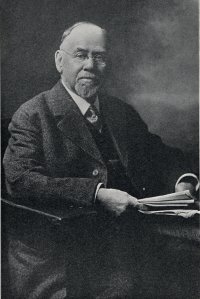There are no citizens more worthy of the respect and esteem of their fellowmen than those who build up the commerce and industries of the country. Of this type was John Bannister Wild, one of Utica's foremost business men, who left the impress of his individuality in notable measure upon the history of the city, and his death, which occurred on September 21, 1917, at the ripe age of seventy-eight years, was a distinct loss to the community, in which he was greatly beloved. A pioneer in the upbuilding of the knit goods industry in the Mohawk valley, his life was one of achievement, where precedent did not exist to guide, but the resourcefulness and strength of the leader were called upon to erect the guidepost of progress and success. He was a native of England. He was born in Stockport, October 14, 1839, and during his childhood his parents, John and Alice (Walker) Wild, came to the United States. He attended the public schools of Olneyville, Rhode Island, and Cannelton, Indiana, and after completing his education became a textile worker. He was employed in the mills of Cohoes, New York, and Indian Orchard, Massachusetts, and in 1862, when a young man of twenty-three, demonstrated his loyalty to his adopted country by enlisting in the Eighth Massachusetts Volunteer Infantry, in which he served for about a year, gallantly defending the Union cause on southern battle fields. After receiving his honorable discharge Mr. Wild resumed his former occupation and for several years worked in the knitting mills at Oswego and Oswego Falls, acquiring a comprehensive knowledge of the industry. Ambitious to advance, he formed a partnership with Charles Stewart, and in 1870 they established a knitting mill in Utica. Mr. Stewart died soon afterward, and on April 1, 1874, Nicholas E. Devereux became associated with Mr. Wild in the knitting business. They opened a small factory in the Seymour building, on Jay street, and theirs was one of the first industries of the kind established in the city. They started with a force of twenty-seven employes and the business grew so rapidly that in 1886 they decided to build a large plant, securing a suitable location on Broad street. In 1898 the business was incorporated under the name of the Oneita Knitting Mills, and two years later the firm erected another factory, which they equipped with twenty-five thousand spindles. This has become one of the largest knitting mills in the state and produces about two thousand dozen undergarments a day, a large proportion of them being union suits. About fifteen hundred employes are required to operate the mills, and their output is unsurpassed in quality and durability. From the time of its organization until 1903 Mr. Wild was president of the company and continued to serve on its board of directors until he retired from business several years prior to his death. Regular in habit and methodical in action, he made every moment count for the utmost, and his quick, intuitive mind never failed to meet an emergency when it arose. His labors constituted a dynamic force in the development of one of the country's great productive industries, which he built upon the enduring foundation of honor and integrity, erecting an imposing monument to his enterprising spirit and his powers of organization and administration. He was also one of the incorporators of the Shenandoah Cotton Company and served as one of its officers.
On October 14, 1866, Mr. Wild was married to Miss Sarah Matilda Clark, who died June 9, 1898. In 1914 Miss Carolyn Merwin became his wife. He is survived by a sister, Miss Alice Wild of Utica, and by a widow and three children, namely: William H., president of the Canasawacta Knitting Mill of Sherburne, New York; Elida Helen, the wife of Francis J. Frey of New York city; and Clara Frances, who married Edward J. Otis of Utica.
Mr. Wild attended the Memorial church of the Holy Cross and was a member of its board of trustees. He belonged to John F. McQuade Post, No. 14, G. A. R., and to the Fort Schuyler Club. He was a frequent visitor at the club and, was very popular among its members. He was a tireless worker and his democratic spirit inspired in his men a warm feeling of comradeship, while he had a deep sympathy for the workingman. He was loved for that kindly spirit which caused him to appreciate the good qualities of his fellowmen, and his name is written high on the roll of Utica's honored dead.
